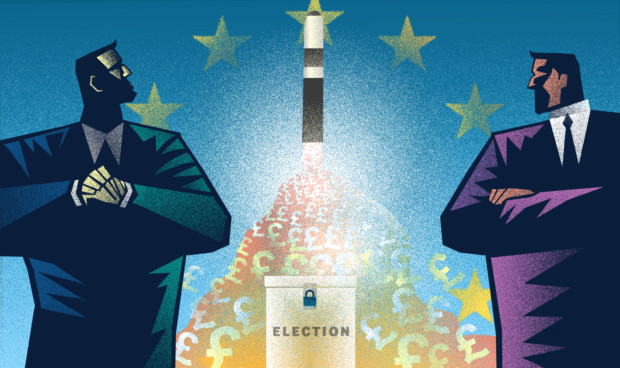
The United Kingdom parliament will be dissolved this month in advance of the May 7 general election, the first since 2010. The ballot is the most uncertain for at least two decades, with five parties in England (six in Scotland) polling more than 5 per cent of the vote for the first time in modern UK political history.
While the election has received significant attention for its potential impact on domestic policy, it could also have key implications for long-standing tenets of post-war UK foreign policy. This includes potential ‘fast-track exit’ from the European Union (EU) — adding to wider European disintegration woes, given the possibility of Greece’s departure from the Eurozone in 2015.
Moreover, there is intensified debate over renewal of Britain’s independent nuclear arsenal at a time when there are growing warnings about a more assertive Russia. This important decision, to be made next year with a price tag of at least £25 billion (Dh138.6 billion), is opposed by numerous minor parties, which could end up sharing power in a post-election pact. For, in the midst of all the electoral uncertainty, a second consecutive ‘hung parliament’, in which no one party wins a majority of seats, appears likely. This would be unprecedented in modern UK political history and may result in a second straight coalition government in London — potentially this time comprising a patchwork of more than two parties.
This is because it could require more than two to secure a majority of the 650 seats in the House of Commons. That is, unless Labour and Conservatives were to join in a so-called National Government last seen during the Second World War.
A second possibility is that the party that wins the largest number of seats will run a minority government. Such an administration could potentially function through a so-called ‘confidence and supply’ arrangement whereby one or more other parties agree to support the government in motions of confidence and potentially budget/appropriation votes by voting in favour or abstaining.
Given the potential need for multi-party pacts in either scenario, politicians are jockeying with each other about their price for a deal. For instance, the United Kingdom Independence Party (Ukip), which is a party built around a policy of British exit from the EU, won its first two seats in parliament in 2014, and has pledged to potentially support the Conservatives if the latter agrees to a fast-track ‘in-out’ referendum, potentially in the second half of this year.
Prime Minister David Cameron asserted in January that he would be “delighted” to hold such a fast-track plebiscite on membership of the EU, which Britain first joined in 1973. His comments make the possibility of a Conservative-Ukip pact increasingly possible and a speedy EU referendum with it. And with polls showing the British population broadly split on the question of being in or out of the EU, the prospect of exit (or so-called Brexit) is therefore real. As well as the significant economic damage this could result in, Brexit would also have a profound impact upon the EU. This includes disrupting the currently-28 member state’s balance of power, inner workings, policy orientations, and international standing.
Another example of where there is renewed debate over a longstanding tenet of UK foreign policy concerns the Trident independent nuclear deterrence. For instance, Plaid Cymru, the Welsh national party, and the Greens that currently have three and one MPs respectively, are open to an electoral arrangement with Labour but will only do so on the basis that the latter reverses its current policy pledge to renew Trident.
Previously, the Scottish National Party (SNP) — which currently has six MPs, but polls indicate could win many more in May — had also insisted on this conditionality as a requirement for supporting Labour too. However, SNP leader Nicola Sturgeon declared last Friday that her party had changed tack and would potentially support Labour, on a case-by-case basis, in a supply and confidence arrangement without a deal on Trident.
Since 1998, Trident has been the only operational nuclear weapons programme in UK service. Britain has long had a nuclear arsenal after becoming the third country, behind the US and former Soviet Union, to independently test a weapon in 1952 and is currently one of five nuclear weapons states under the Non-Proliferation Treaty alongside China and France. Inevitably, this issue is of key interest to UK allies, including the US. And the debate comes in the context of remarks this month from US Army Chief-of-Staff Raymond Odierno who expressed that he is “very concerned” about the impact of spending cuts on the UK’s international military capability.
Another post-election possibility that may have international ramifications could follow from a Conservative pact with the Democratic Unionist Party (DUP), which currently holds eight seats in the House of Commons. The DUP would probably want more powers and financing for Northern Ireland as a price for such a pact. The Nationalist parties, however, would potentially be concerned that such an electoral understanding could result in concessions that jeopardise the Northern Irish peace process.
Looking forward to May, in the event of a second consecutive hung parliament, the precise parliamentary arithmetic will help decide whether there is a coalition or minority government. The closer either the Conservatives or Labour get to 326 of the total 650 seats in the House of Commons, the more likely a minority administration may become.
However, whether coalition or minority government, another hung parliament could have key foreign policy implications for Britain and its allies, including injecting new uncertainty into the debate over renewal of Trident and the UK’s membership of the EU — two key planks of British foreign policy for decades.
Andrew Hammond is an Associate at LSE Ideas (the Centre for International Affairs, Diplomacy and Strategy) at the London School of Economics.








